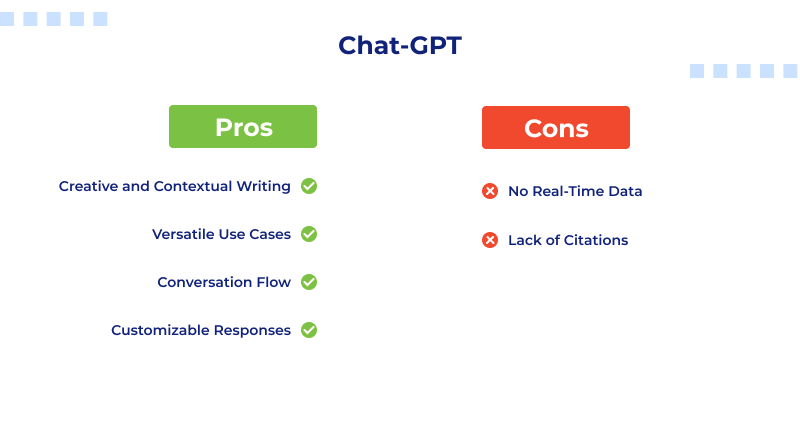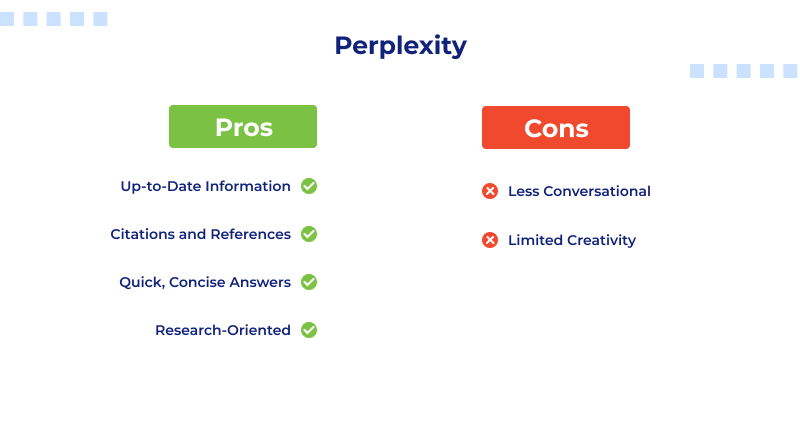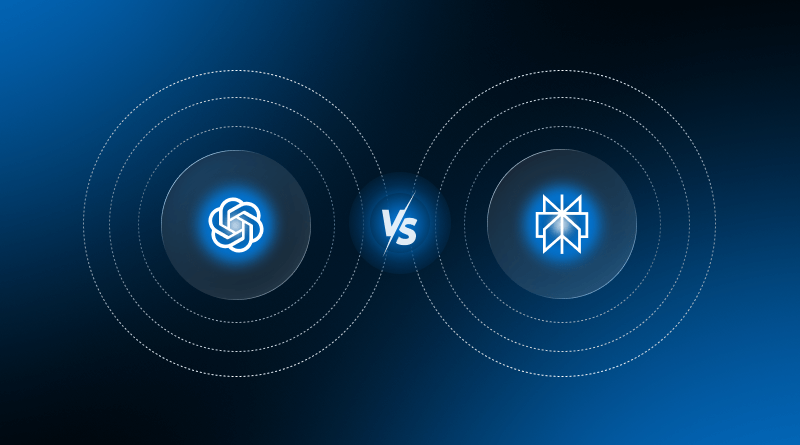AI Chatbots are now accessible at everyone’s fingertips. You install an application or browse the best AI tools on the web. ChatGPT, Gemini, Meta AI, and more have been trending. However, the new AI-powered search engine, “Perplexity,” has joined the ranks. Founded in 2022, the parent company of this tool, Perplexity AI, Inc., is now valued at $18 billion USD. What made it so special is that the debate between ChatGPT vs Gemini has not faded away.
The blog highlights a productive discussion of ChatGPT vs Perplexity. Here is a head-to-head comparison between the tools. Find the right one for you!
Table Of Content
What is ChatGPT?
ChatGPT is an AI Chatbot developed by OpenAI. It utilizes NLP (Natural Language Processing) to generate human-like text, images, and other content in response to user prompts. By utilizing Large Language Models (LLMs), it can comprehend and generate a diverse range of content, including essays, code, creative writing, and data analysis. Users may also use ChatGPT to ask questions, make requests, and even post images or audio to generate a detailed and contextually relevant response.
What is Perplexity?
Perplexity AI, or an AI-powered search engine, is like Google blended with AI. It generates comprehensive answers to questions, citing different source content. Unlike conventional search engines, Perplexity AI synthesizes information from real-time web searches and several AI models to deliver contextual, updated, and follow-up responses with citations.
Perplexity vs. ChatGPT: Quick Comparison At a Glance
Here’s a detailed overview of ChatGPT vs Perplexity based on their features and pricing.
| Feature | ChatGPT | Perplexity AI |
| Primary Function | Conversational AI chatbot. Excels in creative tasks, content generation, and dialogue. | AI-powered search engine. Excels in research, fact-finding, and summarizing information. |
| Source Citations | Minimal to no citations by default. | Provides real-time sources and citations for every response. |
| Data Freshness | Knowledge is based on its training data, with web search capabilities available in paid versions. | Primarily uses real-time web searches to provide the most current information. |
| Use Cases | Writing, brainstorming, creative content, coding, language translation, and general conversation. | Academic research, market analysis, fact-checking, summarizing documents, and staying updated on current events. |
| Accuracy | Generates information that can seem realistic but inaccurate and might not update ones. | Overall, it is more credible regarding factual information as it is based on the cited, real-time web sources. |
| User Interface | Designed for natural conversation and has been designed to resemble a messaging application. | The answers are well-organized and short, given in the form of summaries with numerical references. |
| Multimodal Capabilities | Can generate and analyze images with DALL·E 3 and is capable of voice and file uploads in its paid versions. | More focused on text-based research, though it offers some advanced features for data analysis and file uploads. |
| Pricing | Has a free plan with limited features and a paid subscription model (ChatGPT Plus). | Offers a free version with a limited number of “Pro” searches per day, with a paid Pro plan for full access. |
ChatGPT vs Perplexity: Key Differences & When to Use Each
1. Core Purpose and Functionality
ChatGPT is designed as a conversational AI excelling in generating human-like responses. It assists users with creative writing, brainstorming, learning support, coding, and more. The natural tone of the generated response is its major USP. Hence, professionals, academicians, or students across different niches enhance their creativity using the tool.
Perplexity functions as an AI-powered search engine. It retrieves information from web sources, cites references, and offers updated answers. It is good for fact-checking, research, and the quick accessibility of the information. It is particularly useful for users who prioritize accuracy and real-time data.
2. Accuracy vs Creativity
ChatGPT generates human-like content, including creative, contextually relevant, and more. The AI chatbot is a preferred option for tasks such as drafting blogs, writing marketing copy, studying notes, or role-playing. Thus, you have ChatGPT prompts for video scripts, ChatGPT prompts for image creation, and more. However, it doesn’t always cite sources, and obtaining the real-time data is challenging.
Perplexity is considered the best AI tool when it comes to queries, which require a lot of fact-checking. It fetches the information in the web itself, providing links and citations along with each response. Even though it is not as chatbot-conversational or narrative as ChatGPT, it is more efficient in terms of research, information verification, or keeping up with the newest news and trends.
3. User Experience and Interface
WithChatGPT, the user does not get the feeling of talking to a somewhat lifeless digital assistant. The website has got an interactive interface, which leads the user through the process step by step and matches their tone and style. In addition, it retains context in long conversations. This AI model can prove more appropriate to people who focus on personalized interaction using LLM model.
Perplexity’s interface delivers accurate and concise answers, citing references. It resembles a simple and sleek user interface that focuses primarily on reference-based responses. In this, you won’t find any lengthy discussions.
ChatGPT vs Perplexity: Pros and Cons
ChatGPT

Pros of ChatGPT
– Creative and Contextual Writing
ChatGPT is an effective AI tool that generates creative and context-rich content. It is perfect for blogs, marketing copies, storytelling, and social media posts. Its natural approach to writing ensures interesting and search engine friendly writings that are attractive to the search engines and the readers.
– Versatile Use Cases
ChatGPT is flexible in its scope: one can brainstorm new ideas, write emails, and explain complicated concepts in a professional way, among other tasks. Such a feature makes it a useful tool both to students and businesses and to the creators of content.
– Conversation Flow
Unlike conventional tools, ChatGPT streamlines the conversation flow and remembers context across multiple interactions. This feature enables the creation of more personalized, interactive, and meaningful discussions, making it ideal for long-form projects or customer support scenarios.
– Customizable Responses
With ChatGPT, you adjust tone, style, and level of detail to match your needs. Whether it is a formal business pitch, a casual blog post, or SEO-optimized website content, this adaptability ensures your content connects with the right audience.
Cons of ChatGPT
– No Real-Time Data
Since ChatGPT does not access information directly on the internet, its answers may not necessarily reflect the most recent updates, patterns, and news. This may impose accuracy constraints on time-sensitive issues, such as finance, technology, or market research.
– Lack of Citations
ChatGPT does not provide references or citations, although it presents detailed and well-structured answers. It serves as a go-to tool for anyone seeking fresh insights” to the more active “It’s a go-to tool for fresh insights. It is particularly applicable while producing academic, research-based, or data-driven content.
Perplexity

Pros of Perplexity
– Up-to-Date Information
Perplexity pulls data directly from the web, ensuring its answers are current and relevant. It serves as a go-to tool for anyone seeking fresh insights, trending updates, or real-time market information.
– Citations and References
Perplexity provides openness and authoritativeness through every reply to its statements. This aspect is particularly applicable to researchers, students, and professionals who use proven information to make informed decisions.
– Quick, Concise Answers
Perplexity is designed to be fast, providing short and precise answers that save users time. Rather than lengthy descriptions, it provides fact-based information that is easy to scan and digest, perfect for quick research.
– Research-Oriented
Perplexity is citation-friendly and accuracy-oriented. It offers a trusted balance between AI and human-level verification, whether you are verifying statistics, fact-checking, or assembling industry intuition.
Cons of Perplexity
– Less Conversational
Compared to ChatGPT, Perplexity lacks a more natural style of dialogue and is not suitable for interactive discussions or creating individual content. It is more of a search engine than a talk show.
– Limited Creativity
Perplexity is not the best option for storytelling, brainstorming original ideas, or creating marketing content that requires creativity and uniqueness, as it focuses more on accuracy than creativity.
When comparing ChatGPT to Perplexity, the correct decision depends on your desired outcome. ChatGPT is the best conversational AI for creating creative, personalized, and engaging text. Its flexibility in tone changes, preservation of context, and assistance with tasks such as writing, coding, and brainstorming have made it an excellent online companion for students, businesses, and creators who appreciate depth and originality.
Conversely, when your focus is on accuracy, references, and real-time data, then Perplexity will suit you better. Its research-based methodology and opportunities to extract real-time data directly from trusted web sources mean that you receive the most recent and valid data. Finally, ChatGPT is more creative and communicative, whereas Perplexity is more fact-checking and research-oriented, which makes it powerful enough to be used in either case: to engage in conversation with an interesting person or to find the correct answer.
FAQs
1. WWhat is the core purpose of each tool?
ChatGPT is primarily a versatile conversational AI assistant built for creativity, coding, and general problem-solving.
2. How do they handle source citation and research?
Perplexity is designed as an “answer engine” that consistently provides real-time, source-backed answers, while ChatGPT provides sources less prominently, mainly when its web browsing feature is active.
3. Which one is generally better for creative writing and dialogue?
ChatGPT excels in creative writing, maintaining a natural, fluid conversational flow, and handling open-ended dialogues effectively.
4. Which AI tool is better for real-time, up-to-date factual information?
Perplexity has a decisive edge for current facts and research as it is always integrated with live web search, while ChatGPT relies more on its pre-trained data unless explicitly prompted to browse.








